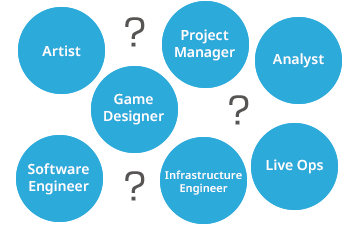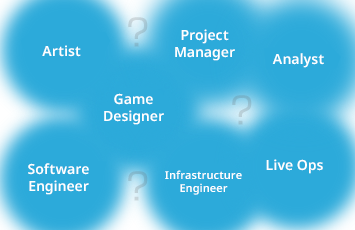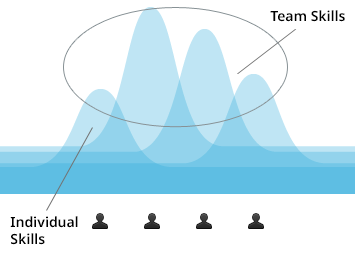Aiming Developer Credo
Project-Oriented Organization
The Necessity of Interdisciplinarity


We constantly challenge ourselves with new technologies and platforms. The business environment surrounding games is also changing rapidly.
In such situations, where there are no clear answers, excessive division of labor or hierarchical structures can lead to failure. This often results in creating “the other side” (another department or a superior) as the scapegoat for failures.
Creating successful games and services requires a variety of people: producers, planners, 2D and 3D graphic artists, UX and UI designers, scripters, data workers, KPI analysts, marketers, user support staff, and more. These individuals, with their diverse expertise, must come together as a team without hierarchical barriers to achieve a common goal.
Our work inherently requires interdisciplinarity.
The Value of T-Shaped Skills and Study Groups

Excessive specialization can also lead to failure in engineering. Dividing roles into “server development,” “game client development,” and “DB design” often results in blame-shifting when issues arise, such as “this is the server developer’s fault.”
In online games, servers, game clients, and databases must work together seamlessly. At the very least, a game client developer must have enough experience to understand what a server developer is saying; otherwise, misunderstandings can lead to conflicts.
Having broad, shallow knowledge and curiosity outside one’s specialty is crucial for reducing conflicts.
We regularly hold company-wide, departmental, and project-specific engineer study groups. These study groups are invaluable for broadening knowledge.
In the past, topics have included 3D graphics, game engines, web service scalability, source control and deployment methods, infrastructure, and more. Participation in study groups unrelated to one’s project is also encouraged.
The Value of Curiosity

T-shaped skills are an expression of curiosity, and curiosity is the ability to enjoy change.
Clinging too tightly to familiar languages, libraries, or platforms as an engineer can create a culture resistant to change and lead to legacy systems. A true specialist in X is not someone who knows only X but someone who understands X’s strengths and weaknesses in the context of Y and Z. A true specialist is willing to abandon X if it becomes obsolete.
Individual curiosity fosters an organizational culture that embraces new environments, creating resilience against obsolescence and a foundation for new challenges.
